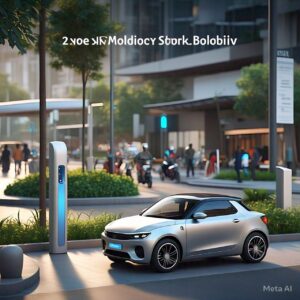Bengaluru, India’s Silicon Valley, is not just revolutionizing tech—it’s also transforming how millions move every day. As traffic congestion, air pollution, and population pressures mount, the city is reimagining transport through smart mobility innovations. From electric vehicles (EVs) to AI-powered traffic systems, micro-mobility, and Mobility-as-a-Service (MaaS), Bengaluru is becoming a national leader in sustainable urban transport.
This article explores how Bengaluru’s smart mobility ecosystem is being shaped by government policies, startups, public infrastructure, and emerging technologies.
Why Smart Mobility Matters in Bengaluru
With over 13 million residents and thousands migrating every month, Bengaluru faces:
-
Chronic traffic jams
-
Long commute times
-
Air pollution
-
Inadequate last-mile connectivity
Smart mobility is not just a trend—it’s a necessity. The city needs multi-modal integration, green transport, and tech-powered efficiency to ensure a livable future.
Electric Vehicles (EVs): Accelerating Bengaluru’s Green Goals
Bengaluru is leading India’s EV revolution, thanks to proactive state policies and a booming ecosystem of startups and manufacturers.
Key Drivers of EV Growth:
-
Karnataka EV Policy: Offers tax incentives, subsidies, and land support.
-
Charging Infrastructure Expansion: Fast-charging stations are being set up in malls, IT parks, and metro stations.
-
Homegrown EV Startups:
-
Ather Energy – high-performance electric scooters
-
Ultraviolette Automotive – futuristic EV bikes
-
Bounce Infinity – battery swapping and EV rental services
-
Bengaluru is on its way to becoming India’s EV capital, with a sustainable and intelligent mobility backbone.
Mobility-as-a-Service (MaaS): Seamless Commuting via One App
One of the most exciting transformations is the rise of Mobility-as-a-Service (MaaS)—a digital-first approach that combines buses, metros, bikes, ride-sharing, and micro-mobility into a single app ecosystem.
Benefits for Commuters:
-
Book and pay for multiple modes in one app
-
Real-time updates and smart route suggestions
-
Integration with metro stations and BMTC buses
Platforms like Yulu, Rapido, and upcoming unified mobility apps are creating a frictionless, multimodal experience—reducing the city’s dependence on private vehicles.
Micro-Mobility & Last-Mile Solutions
Bengaluru’s traffic woes don’t end with metros or buses—the last-mile gap has long been a pain point. Enter micro-mobility: electric bikes, scooters, and shared bicycles offering short-distance connectivity.
Game-Changers:
-
Yulu e-bikes are stationed at tech parks and metro stations
-
Bounce EVs are available on pay-per-minute models
-
Docking stations across business hubs and residential zones
These services not only cut emissions but also reduce parking stress, short-trip traffic, and first-mile/last-mile inefficiencies.
The Public Transport Backbone: Metro & BMTC Upgrades
Smart mobility can’t succeed without a strong public transport foundation.
Bengaluru’s Key Improvements:
-
Namma Metro: Ongoing expansions in Phase 2 and 3 to cover more zones
-
BMTC: Inducting electric buses with GPS and digital ticketing
-
Integrated Mobility Plans: Allowing smoother transfers between buses, metro, autos, and e-bikes
Metro-Bus integration and smart bus shelters with live updates are key parts of Bengaluru’s smart city roadmap.
AI, IoT, and Big Data: Bengaluru’s Traffic Tech Arsenal
Bengaluru is leveraging AI, IoT, and real-time data to enhance mobility and safety.
Examples of Smart Traffic Management:
-
AI-powered adaptive signals that auto-adjust to traffic patterns
-
IoT-based smart parking systems that reduce circling time
-
ANPR cameras for automatic number plate recognition
-
Drones for aerial traffic monitoring
The integration of data-driven insights into mobility planning is turning Bengaluru into a smart city transport leader.
Startup Ecosystem & Institutional Support
What truly powers Bengaluru’s smart mobility vision is its robust startup culture and institutional ecosystem.
Startups Fueling Innovation:
-
Ather Energy, Yulu, Bounce, MoveInSync
-
Platforms offering corporate transport optimization, EV infrastructure, and real-time navigation
Institutional Support:
-
Karnataka Startup Cell offers:
-
Funding and grants
-
Mentorship
-
Networking and incubation
-
-
Premier institutions like IISc, IIM-B, and IIIT-B provide talent, research, and policy insights.
Startups also thrive in the presence of unicorns like Swiggy and Zetwerk, proving that mobility tech in Bengaluru can scale globally.
Government and Policy Push
The Karnataka Government plays a vital role in smart mobility, with support from central initiatives like the Smart Cities Mission and FAME (Faster Adoption and Manufacturing of Hybrid and Electric Vehicles).
Key Policies and Programs:
-
Urban Mobility Labs to test pilot programs
-
Bengaluru Mobility Plan (BMP) for integrated urban transport
-
Priority lanes for buses and EVs
-
Public-private partnerships for EV charging infrastructure
This proactive governance model ensures long-term growth and innovation.
Smart Mobility = Sustainable Mobility
The vision for a cleaner, greener, more sustainable Bengaluru is at the core of smart mobility.
Environmental Impact Goals:
-
Reducing vehicular emissions
-
Promoting non-motorized transport (NMT) like walking and cycling
-
Creating eco-smart zones and low-emission corridors
Sustainable mobility aligns perfectly with India’s net-zero goals, and Bengaluru is emerging as a model for other cities to follow.
Roadblocks to Watch
Despite progress, Bengaluru faces several challenges:
-
Inter-agency coordination issues
-
Inconsistent last-mile infrastructure
-
Behavioral inertia in adopting shared and green transport
-
Affordability and access gaps in smart solutions
Addressing these with community engagement, policy refinement, and better tech scalability will be key to long-term success.
What the Future Holds
The next decade will see Bengaluru evolve into a smart mobility showcase:
-
AI-driven public transport with predictive analytics
-
City-wide EV zones with autonomous vehicles
-
Fully integrated multi-modal, app-based transport networks
-
Walkable, bikeable urban layouts
-
Enhanced urban-rural mobility links through satellite town planning
Final Thoughts: Bengaluru Is Driving the Change
Bengaluru is not waiting for the future—it’s building it. Through a dynamic mix of innovation, collaboration, and policy backing, the city is setting the pace for India’s urban mobility evolution.
From electric scooters on Indiranagar streets to drone-monitored traffic in Electronic City, Bengaluru is proving that smart mobility isn’t a luxury—it’s the new normal.


